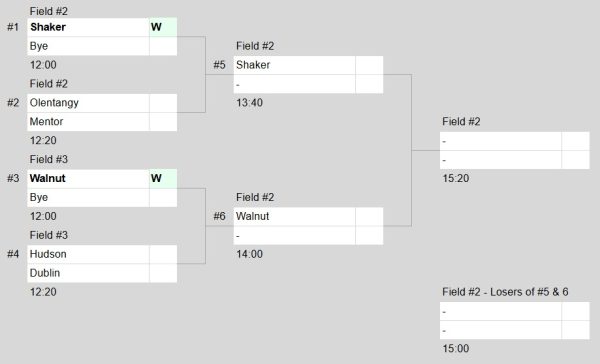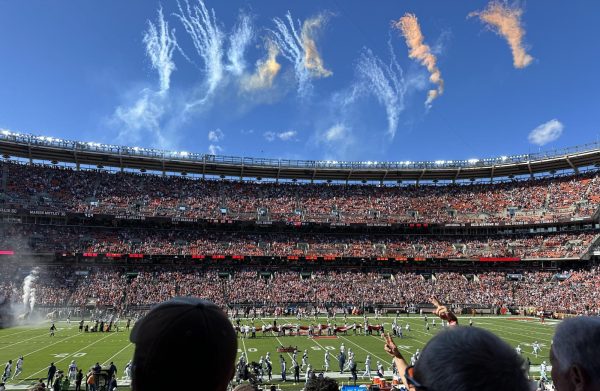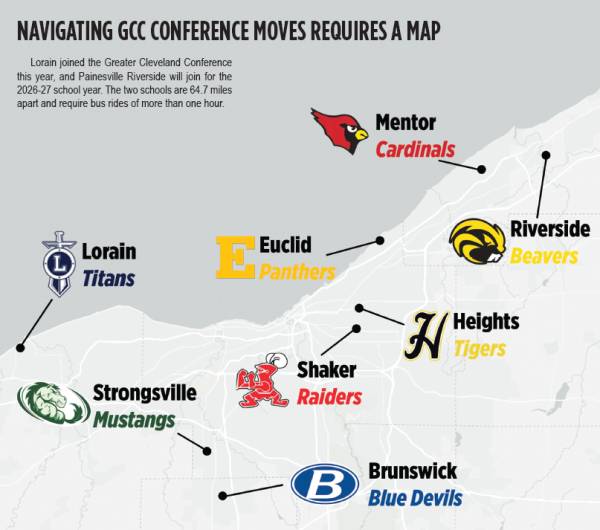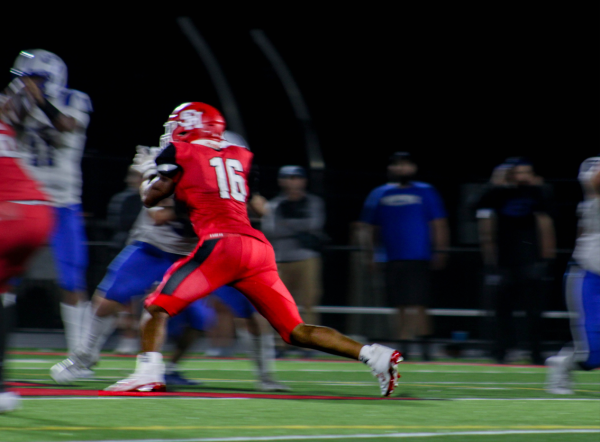‘Team Chemistry’ is a Formula for Success
Shaker teams across the board are searching for the formula for success. Head Baseball Coach Michael Babinec thinks he’s found it.
With eight years of experience, Babinec uses spring training trips, college visits and motivational guest speakers each year to strengthen his team’s camaraderie and build a winning squad.
“All of these non-baseball interactions establish opportunities for players to dialogue, communicate, argue, compromise, and ultimately decide as a team,” Babinec said. “It is invaluable when it comes time to do the same types of things and use the same types of skills during competitive baseball on the field.”
In a new effort to construct greater team spirit, Babinec assigned the team to read and annotate Jim Tressel’s book, “The Winner’s Manual.” Tressel, a 12-time NCAA Coach of the Year recipient, whose college coaching career included six Big Ten championships, wrote his book to help lead other teams to victory. He resigned as coach at The Ohio State University amid a scandal involving players selling team memorabilia in exchange for tattoos, against NCAA rules.
“The Winner’s Manual” is a simplified version of the “success” binder Tressel distributed to his team each year. The binder includes about 400 pages of goal-setting aids, motivational quotes, poems, speeches and team-building philosophies.
Babinec organized a discussion session with Tressel. Excited for this opportunity, the players were eager to find a new identity for the team after an early end to their season last year.
The Raider baseball team traveled to The University of Akron Nov. 5 to meet with Tressel and discuss his ideas in a two-hour session. The former coach is the executive vice president for student success at Akron and teaches a class on coaching.
According to Tressel, the success of the team is based on individual successes and unselfishness. “Everyone is selfish,” Tressel said in his November session. “If we could become a lot better at becoming ‘selfless,’ we’d have a much better team and a much better society.”
It was words like these that inspired many baseball Raiders. “It was an experience that was something special, being able to meet a coach who won a national championship,” senior Nigel Vinson said. “I think that our team will embrace Coach Tressel’s ideas, and his ideas of unification have helped us build a stronger unit.”
“Honestly, I can’t find the right word(s) to describe it,” junior Arpit Agrawal said. “It was an opportunity that people usually only dream about. I was able to take a lot from it as well, but the concepts we read had a much different impact when they were spoken by a legend like himself.”
However, part of the team is the individuality of its members. Each player carries a certain role within the team, on and off the field. “The team can’t grow if the individual can’t grow,” Tressel said.
Working together to fulfill these roles is what ultimately leads to success. For a successful team, all team members must appreciate one another. “True success is achieved when our main concern is the good of others and the building up of the team,” Tressel said.
“Along with the returning talent on varsity this year, I think Tressel’s ideas are going to be the final component to the team’s success,” Agrawal said. “But I think more importantly, the experience is going to resonate with my teammates and I for the rest of our lives.”
Tressel sees team chemistry as a science that goes beyond sports. He emphasizes that anyone can utilize these ideas– parents, doctors, businessmen. “The harder people work on the whole package of purpose and goals, the better they’re going to be for the people around them,” he said.
For many of Shaker’s varsity teams, team chemistry is critical for success. This mutual understanding between team members is built on anything that improves team performance. Through personal relationships and shared experiences
such as team dinners, wake ups and outside work out sessions, teams build strong relationships with players and coaches.
For the hockey team, team dinners helped players bond. “They helped us get along off the ice,” junior Jordan Davenport said. “The ability to reminisce on games and moments off of the ice, as well as laugh and interact with each other really created a better bond on the ice.”
Other teams travel to tournaments during the offseason. For spring training, the baseball team travels out-of-state, going as far as Los Angeles. The women’s lacrosse team travels to Disney World.
Women’s lacrosse coach Alison Bradford thinks this trip and strong team chemistry translates into winning play. “The more you play together, you get a feel for other players’ tendencies,” Bradford said. “You get a feel for
what your teammate needs and wants you to do before you do it, and that is the ultimate team chemistry.”
According to Bradford, a broad swath of team building techniques including team dinners, team runs, workout groups, fundraising, open gyms and even yoga improves team performance.
As in lacrosse, field hockey coach Hilary Anderson also understands the importance of team chemistry for a successful team. Having led the Raiders to a district championship and the state semifinal in the fall of 2013, Anderson
thinks that players, not coaches, build team chemistry.
“I feel my job is to establish the goals for each individual, as well as the team’s goals, but it is the captains and the team that build the bond,” Anderson said. “I can teach them about commitment and respecting their teammates,
but it is the girls who ultimately have to walk the walk and talk the talk.”
Like Tressel, Anderson claims that in building team chemistry, the team learns field hockey as well as lifelong skills. “Everything they do in field hockey can be used in life or school or a job. The ability to work as a group or team to achieve a common goal happens every day in life. To be able to do this as a teenager will take you a long way in life,” Anderson said. “The lifelong lesson we leave with the girls is that only they control their effort and attitude,” Anderson said. “You cannot control the weather, your teacher, your teammate or the referee, but you can always control your own attitude and effort.”
While players can’t control some aspects of play, they can control their communication. Tressel advocates a team’s communication as vital to its success. “One truth I’ve embraced in life is that you can influence people who
will listen,” Tressel stated in his book. “And if you’re open to being influenced, you can influence others.”
Tressel says that while each player has selfinterests, those players can learn how to be on a team. Tressel says that being a teammate means that “you have to be willing to listen if you’re ever going to be heard.”
Tressel said in his meeting with the varsity baseball team that participating in athletics, clubs or extracurriculars is crucial to the wellness of a student. He believes that shared experiences build key personality traits and are imperative for young adults in everyday life. Tressel’s one piece of advice for high school students is to “[g]et involved. Activity is the best way to build knowledge. Interacting with others is the essence of team science.”
A version of this article appeared in print on 19 February 2014, on pages 24 and 25 of The Shakerite.





